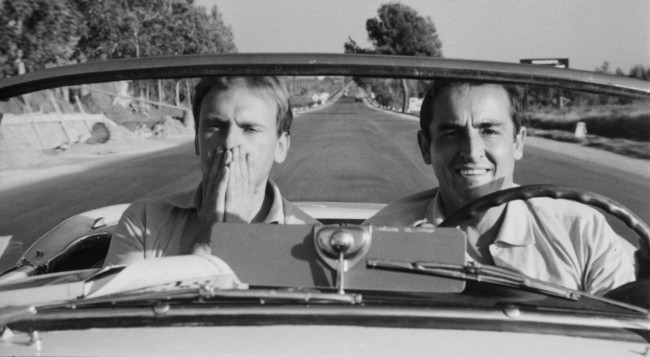Il Sorpasso
dir. by Don Risi
I liked Il Sorpasso: that Risi movie that Payne loves so much. Payne’s been mining Il Sorpasso for decades now. You can tell Risi’s picture left an indelible mark on him—About Schmidt, Sideways, Nebraska: all road movies. And I dug it—Il Sorpass, that is. I liked the little moments on the side of the road: the Latin-speaking priests stranded by a flat tire, the moving truck with the fully-dressed room in its cargo and the fat little man eating his sandwich, the German ladies touring Italy’s countryside cemeteries. It reminded me of a shot in Nebraska when a flock of motorcycles split and swarm round David and Woody’s car. A lot of road trip movies fail to capture these smaller roadside dramas. But Risi and Payne get it. They capture it all. No matter how seemingly mundane the moment, they capture and stamp it for celluloid preservation. (And yes, I am fully aware that Payne shoots on DV now).
Il Sorpasso did it for me. Through and through. So much so that I had to pause the movie halfway through, cigarette twixt fingers, and head to the local deli, Battaglia’s—a true-blue, as-legit-as-it-gets, authentic, primo! Italian delicatessen—where I picked up—despite initial inclinations toward roast beef and cheddar cheese, with a spread of horseradish sauce—a sandwich so perfectly stacked, on a roll, with fried eggplant, roasted peppers, fresh mozzarella, and a drizzle of balsamic vinaigrette, all of which: was topped off with a couple of slices of prosciutto: thin, thin shavings—so beautiful you could kill yourself.
And so I did. Bit by bit. With that cigarette.
I thought I’d stroll back to my place, but that stroll soon turned into a sprightly trot—an awkward kind of power walk. I honed in, even clipped my cigarette so I could get back as soon as possible. (You know: American Spirits: packed so tight, burn so long). I clipped the cigarette and ran back in. I stopped the movie round the point when Bruno and Roberto arrive to Roberto’s childhood retreat—his uncle and aunt’s house. This is after Roberto’s shared his story about Aunt Lida and how he proposed to her when he was but a boy. His first love.
And so the movie goes, from adventure to adventure. Highly reminiscent ofSideways. (Although: it’s always funny thinking of older movies as paying homage to the contemporary—but hey! that’s how I started). We meet Bruno’s—holy shit he has a wife!?—wife. We meet his darling fifteen-year-old daughter and her 50-something fiancé, a man old enough to have fathered Bruno and a slew of other bastard kids. This arrangement doesn’t sit well with Bruno. But the mother seems fine enough. She looks relieved to have finally found someone to help with the financial burden. This is a highly civilized culture here: separated husbands and wives hanging out with each other, 50-something-year-olds casually proposing to teenage prodigies with a knack for coquettish behavior, and so on and so forth. These people are loose with boundaries, with the idea of public and private space. Is anything sacred? Think back to an earlier scene: without a place to piss—the men’s bathroom already occupied—Bruno locks himself in the women’s bathroom next door—while outside: a bonafide woman waits.
No boundaries.
And so the movie goes, and it moves, and it pushes forward, as I eat. One bite at a time. Taking my time. I eat the sandwich with leisure. The garlic and rosemary oil chips, too. (Just like wines and cheese, every good sandwich should be paired with its spiritual bag of chips). The sandwich was delicious. The bread just tough enough on the outside, softened on inside, beneath the crust, with that drizzle of balsamic, the tattered, cut insides of bread stained black with taste. And the crunch of the chips, a mixture of textures wholly satisfying. The right place to be for Il Sorpasso—a movie seemingly about the harms of reticence and the memories lost due to inaction, and the virtues of propulsion, constant momentum, and blah blah blah. If Roberto never left that apartment, his little perch of voyeurism, he would’ve never lived enough to tell any stories. He would’ve never learned how to build courage and ask that girl a question—what girl? any girl, any girl at all! He would’ve stagnated and eventually grown despondent for the world’s refusal to bend to his private script.
And it was perfect. Because I don’t really have the money to be going to Battaglia’s and buying expensive sandwiches and gourmet chips and smoking cigarettes as if I were on a long Roman holiday—an American in search of company through the flicker of a lighter’s flame. But I felt that propulsion, that momentum, and I thought: fuck it, get yourself that sandwich, those chips, that cigarette, stroll like the easy motherfucker you are. And I was eating that sandwich, tasting it, tasting every single part of it, when Bruno finally turned Roberto hedonistic, when the young would-be lawyer finally started feeling those good vibes, the timelessness of time, and commanded Bruno to floor Bruno’s beat-up jalopy all the way to his long-desired honey, his next-door neighbor, the girl he’s been pining for all of eternity from his window perch outlook. And there they were: tearing down the road, whooping out wild calls that the wind would snatch and toss off like highway refuse. They swerved traffic, dipped and dodged, they stressed that horn, and they kept swerving, and they kept closing that long stretch of highway between Roberto and his love, and I watched this and I couldn’t help but think of Sideways again, of how Miles eventually nuts up and drives back to Napa Valley, in the drizzle, in the gray, all that fog and uncertainty, and how he runs up those stairs to Mya’s apartment and—despite it all—knocks on her door for one more chance. I thought about that and my heart shot like a burst of pistons, like the engine inside Bruno’s car: I was revved and ready to see this young sheepish lawyer get his.
And he did.
But not how I expected.
He died.
They swerved one last time, into oncoming traffic, and met the crazed glare of a speeding bus. They yelped—pathetically, cosmically—and spun out of the way. Bruno—the great improviser that he is; the ultimate winner—managed to dive from the car just as it broke the rails and careened over the side of a jagged cliff—Roberto: still strapped to his seatbelt. The car tumbled, right onto its head, repeatedly, bashing poor Roberto to bits. Smashing and smashing and smashing, in revolutions, upon the head, upon his life: earth, car, earth, car, earth, car, etc.
The sandwich went bad in my mouth. The taste and texture suddenly alien to me: prickly, ashen. My mouth dried and I couldn’t swallow. I sensed that it might happen—it was one of those things: where you’ve seen enough movies to kinda portend—I sensed it, but refused to acknowledge it. And I paid for it. This young man, this young spirit, so thin and frail, and so empty on stories and experiences, so thin on women, so thin on their ways, their charms, their secrets, and there he was: shattered upon the rocks, tatters of flesh and bone caught in the tide, the twist of metal, the salted breeze.
It wasn’t right. And not in that holier-than-thou way—that way that discusses the fairness of existence. No, what I mean to say is: the ending isn’t right for the film. It’s a total cop out. A slap in the fucking face. So what? Risi’s saying we don’t deserve transience? That it’s unnatural to us? That it’s fatal? That it kills? This boy finally experiences a life outside the tight confines of his four walls and he’s punished for it?! And? So what? I’m the right one? For sitting here in my living room, off from work due to the sniffles, in this quiet apartment with my sandwich and chips and cigarettes and pajamas, my beard, the dust on the shelves, the forgotten easel in the corner, the wreckage of papers and books, the lack of mobility, the paralysis of the cinema—this is the right way? This isolation, this stagnancy, this lack of extracurricular purpose,this is the way? This is how you protect yourself?
Bullshit.
People’s how you go on. Others. Talking to them, listening to them, meeting them, letting them convince you of something you’re uncomfortable with. That’s the way.
Risi got too smug for his own good. He wanted to spook us, shake us with hissurprise! ending. Well, he certainly surprised us, but at the cost of his film as a whole. I’ll still appreciate everything that comes before the film’s finale, but still—it will remain tainted. To a degree. The ending’s cheap, it’s lurid. It’s vulgar. And it’s disrespectful to the audience. It tells me that Risi isn’t the audacious filmmaker I though him. He went the easy route. He couldn’t figure out how to satisfy with the upbeat—even though he’d been doing it all film long—and instead, “provoked” us with a crass moment of stark fatalism more in suit with the Italian neorealists of the ‘50s.
Shame.
Waste of a beautiful sandwich.






